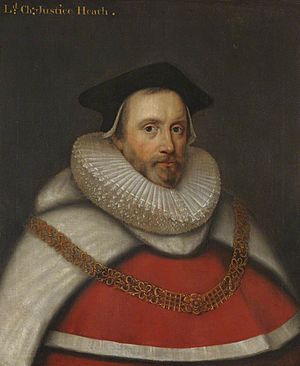Robert Heath facts for kids
Quick facts for kids
Robert Heath
|
|
|---|---|
 |
|
| Born | 20 May 1575 Edenbridge, Kent
|
| Died | 30 August 1649 Calais, France
|
| Resting place | Brasted Church, Kent |
Sir Robert Heath (born May 20, 1575 – died August 30, 1649) was an important English judge and politician. He served in the House of Commons, which is like a part of today's Parliament, from 1621 to 1625. He also held several high-ranking legal jobs for the King.
Contents
Early Life and Education
Robert Heath was born in Edenbridge, Kent. His father, also named Robert Heath, was a lawyer. Young Robert went to Tunbridge grammar school, which is now known as Tonbridge School.
He continued his studies at St John's College, Cambridge when he was 14. Later, he studied law at Clifford's Inn and became a barrister, a type of lawyer, in 1603.
Becoming a Member of Parliament
By 1620, Robert Heath was known as the "Recorder of our Citie of London." This was an important legal role for the city. In 1621, he was chosen to be a Member of Parliament for the City of London.
That same year, he became the Solicitor-General, a top legal advisor to the Crown. He was also knighted, which means he received the title "Sir." He was re-elected as an MP for East Grinstead in 1624 and 1625.
Family Life
Sir Robert Heath married Margaret Miller. She was the daughter of John Miller from Kent. They had six children together. Their children included Robert, John, and Mary. Mary later married Sir William Morley, who was also a politician.
Serving as Attorney General
From 1625, Sir Robert Heath worked for King Charles I of England as the Attorney General. This was the chief legal officer for the King. He got this job thanks to the help of the Duke of Buckingham.
Even though some people thought he was a bit secretive, records show he was a clever lawyer. He often argued strongly to help the King avoid legal problems.
Legal Cases and Mining Interests
In 1625, Heath handled a case for lead miners in the High Peak area. They were arguing against Francis Leke, who wanted to collect a special tax called a tithe from them. Eventually, this tax right was moved to Christian Cavendish, Countess of Devonshire.
Heath also became interested in the lead mines in Derbyshire. In 1629, he partnered with Sir Cornelius Vermuyden to drain water from a rich mining area called Dovegang Rake in Wirksworth.
Important Legal Challenges
Heath represented the King in a famous case in 1627 called Darnel's Case. The judges did not agree with his argument about the King's special powers. This case was very important for the creation of the Petition of Right. The Petition of Right was a document that limited the King's power.
Early Colonial Ventures
Sir Robert Heath was involved in the early plans for the American colonies. He was part of a group looking into the tobacco trade with Virginia in 1627–1628. In 1629, he received a special permission, called a patent, for a large area of land. This land later became North Carolina and South Carolina. He also had rights to the Bahamas. However, he never actually started any settlements there himself.
Becoming a Judge
In 1631, Heath became the Chief Justice of the Court of Common Pleas. This was a very high position in the legal system. However, he lost this job in 1634.
One reason might have been his religious beliefs. He was a Calvinist, which meant he had different religious views from some powerful people at the time, like William Laud. Another reason might have been related to an old agreement about land in Ulster and the City of London. The King was unhappy with how Heath and another lawyer had handled this matter.
After losing his judge position, Heath went back to working as a barrister. His reputation as someone who supported certain religious views did not hurt him later.
Return to the Bench and Final Years
During the First English Civil War, King Charles brought Heath back as a judge. He became the Lord Chief Justice, which is another very important legal role.
One of his cases during this time led to problems for him. In 1642, he presided over the trial of Captain Turpin in Exeter. A year later, Captain Turpin was executed by a Royalist leader. Because of this, Parliament accused Heath of a serious crime in 1644. He left England and passed away on August 30, 1649, in Calais, France.
Works and Legacy
Sir Robert Heath wrote a book called Maxims and Rules of Pleading, which was published in 1694. This book shared his legal knowledge and rules for how legal arguments should be made.
 | Frances Mary Albrier |
 | Whitney Young |
 | Muhammad Ali |

